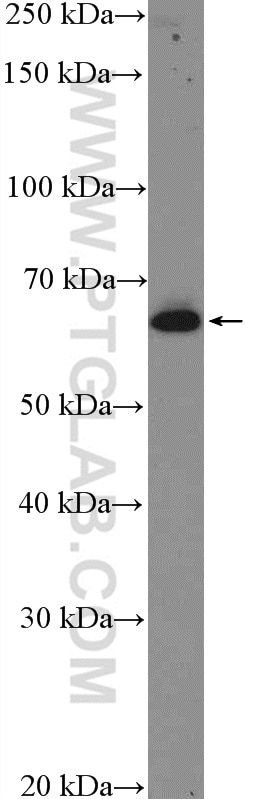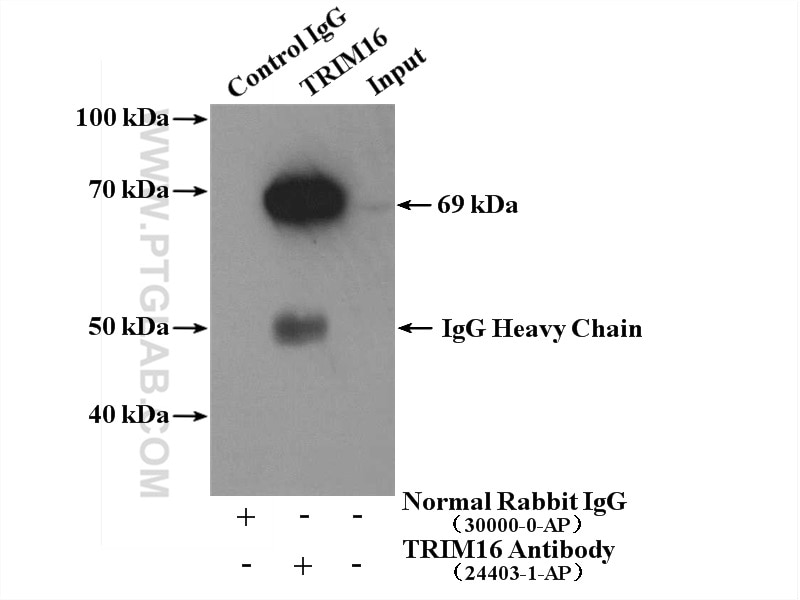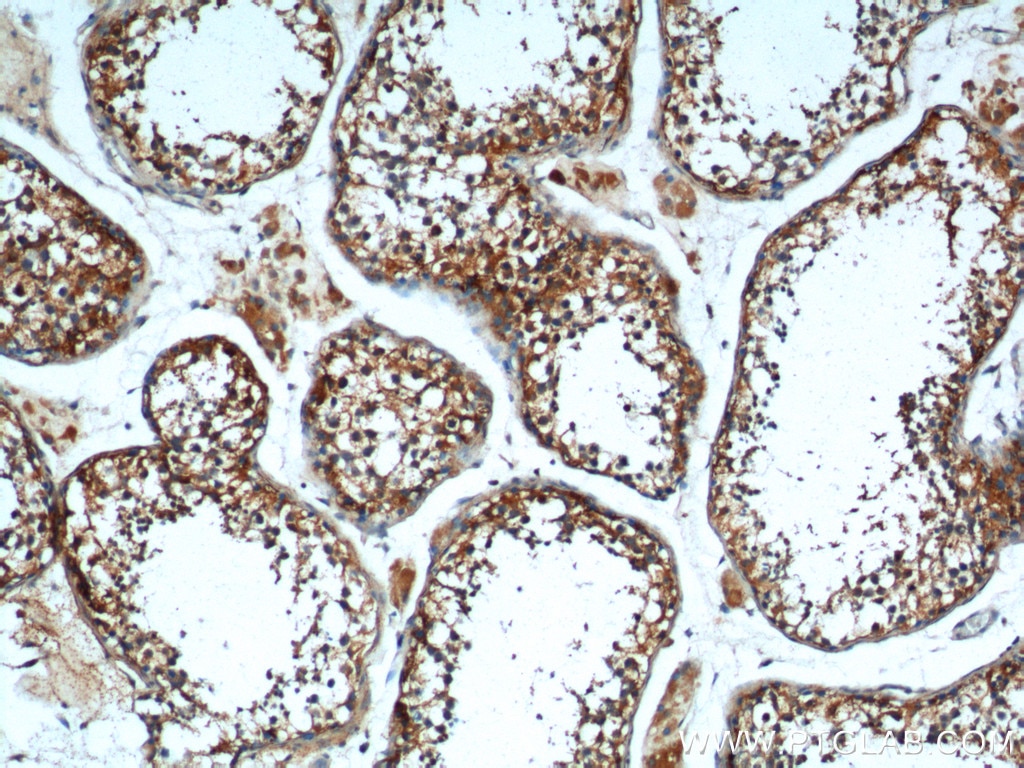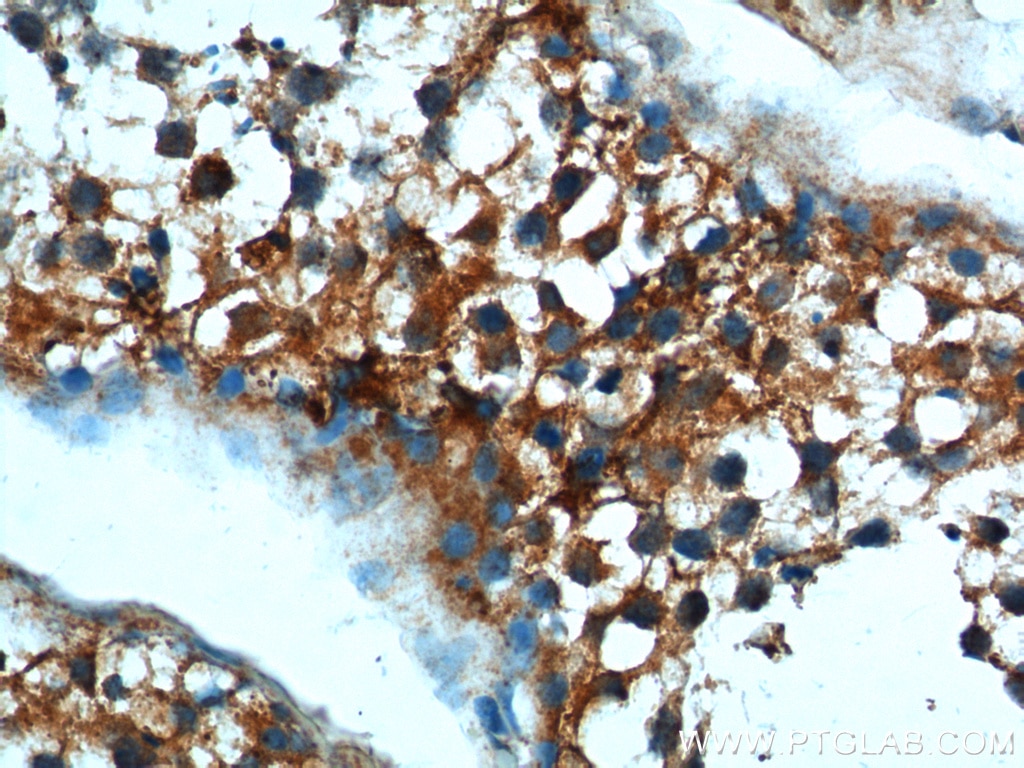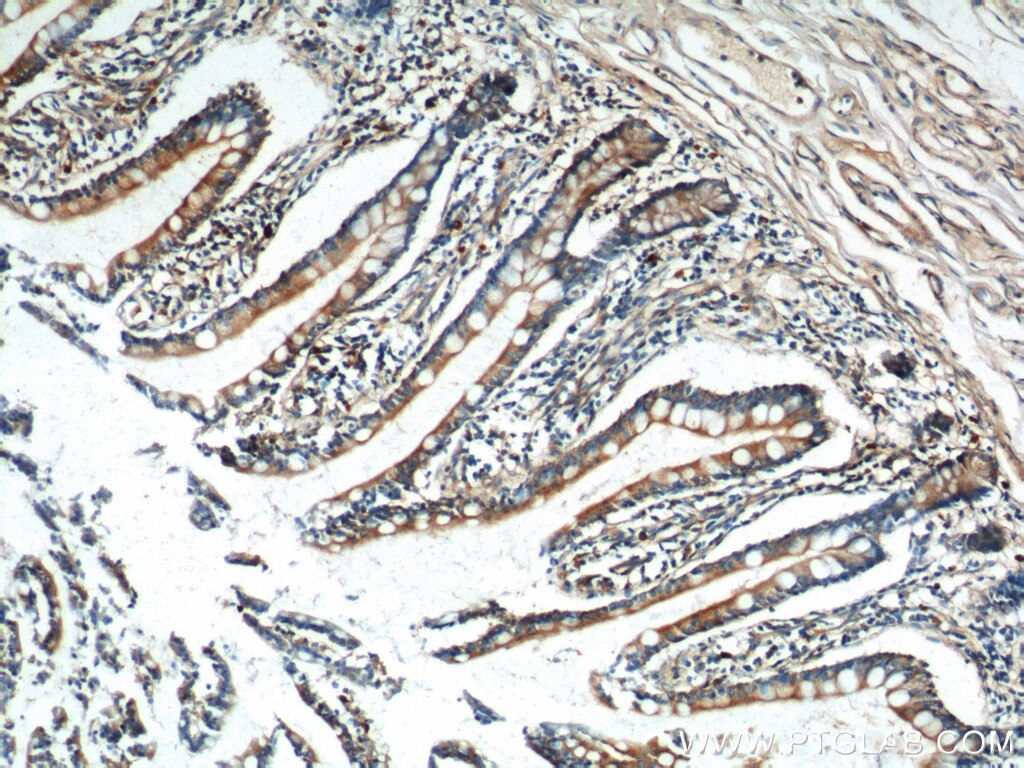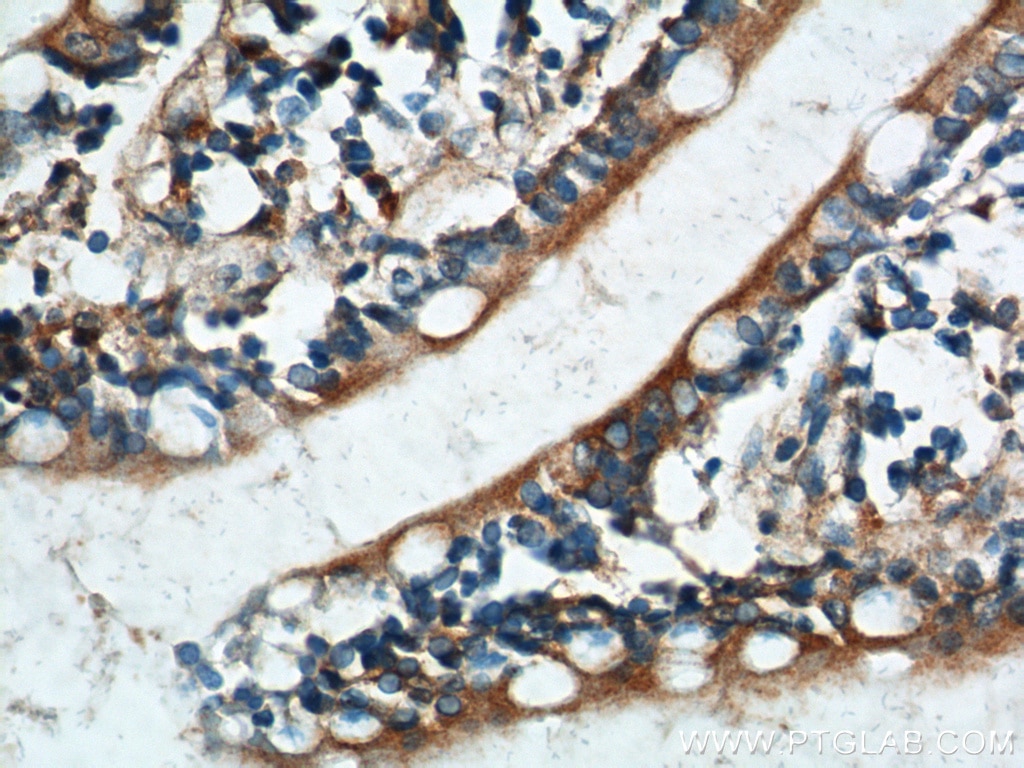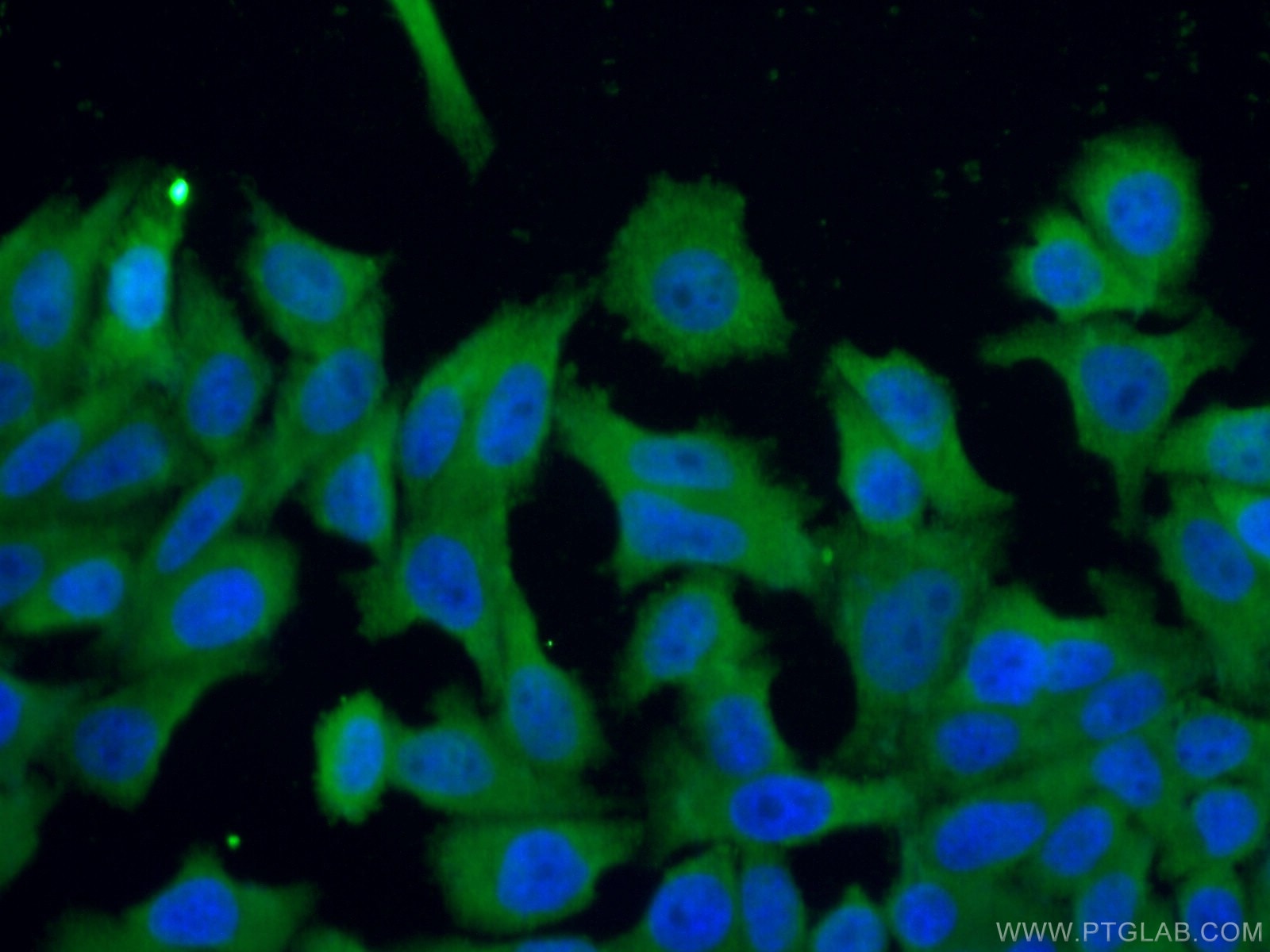- Featured Product
- KD/KO Validated
TRIM16 Polyklonaler Antikörper
TRIM16 Polyklonal Antikörper für WB, IHC, IF/ICC, IP, ELISA
Wirt / Isotyp
Kaninchen / IgG
Getestete Reaktivität
human und mehr (1)
Anwendung
WB, IHC, IF/ICC, IP, CoIP, ELISA
Konjugation
Unkonjugiert
Kat-Nr. : 24403-1-AP
Synonyme
Geprüfte Anwendungen
| Erfolgreiche Detektion in WB | HepG2-Zellen |
| Erfolgreiche IP | HeLa-Zellen |
| Erfolgreiche Detektion in IHC | humanes Hodengewebe, humanes Dünndarmgewebe Hinweis: Antigendemaskierung mit TE-Puffer pH 9,0 empfohlen. (*) Wahlweise kann die Antigendemaskierung auch mit Citratpuffer pH 6,0 erfolgen. |
| Erfolgreiche Detektion in IF/ICC | HepG2-Zellen |
Empfohlene Verdünnung
| Anwendung | Verdünnung |
|---|---|
| Western Blot (WB) | WB : 1:500-1:1000 |
| Immunpräzipitation (IP) | IP : 0.5-4.0 ug for 1.0-3.0 mg of total protein lysate |
| Immunhistochemie (IHC) | IHC : 1:50-1:500 |
| Immunfluoreszenz (IF)/ICC | IF/ICC : 1:20-1:200 |
| It is recommended that this reagent should be titrated in each testing system to obtain optimal results. | |
| Sample-dependent, check data in validation data gallery | |
Veröffentlichte Anwendungen
| KD/KO | See 5 publications below |
| WB | See 10 publications below |
| IHC | See 4 publications below |
| IF | See 1 publications below |
| CoIP | See 1 publications below |
Produktinformation
24403-1-AP bindet in WB, IHC, IF/ICC, IP, CoIP, ELISA TRIM16 und zeigt Reaktivität mit human
| Getestete Reaktivität | human |
| In Publikationen genannte Reaktivität | human, Maus |
| Wirt / Isotyp | Kaninchen / IgG |
| Klonalität | Polyklonal |
| Typ | Antikörper |
| Immunogen | TRIM16 fusion protein Ag21406 |
| Vollständiger Name | tripartite motif-containing 16 |
| Berechnetes Molekulargewicht | 64 kDa |
| Beobachtetes Molekulargewicht | 64 kDa |
| GenBank-Zugangsnummer | BC015674 |
| Gene symbol | TRIM16 |
| Gene ID (NCBI) | 10626 |
| Konjugation | Unkonjugiert |
| Form | Liquid |
| Reinigungsmethode | Antigen-Affinitätsreinigung |
| Lagerungspuffer | PBS with 0.02% sodium azide and 50% glycerol |
| Lagerungsbedingungen | Bei -20°C lagern. Nach dem Versand ein Jahr lang stabil Aliquotieren ist bei -20oC Lagerung nicht notwendig. 20ul Größen enthalten 0,1% BSA. |
Hintergrundinformationen
TRIM16 (tripartite motif-containing protein 16) is an E3 ubiquitin ligase belonging to the tripartite motif (TRIM) protein family, mediates the ubiquitination of its target proteins and tags them for degradation. TRIM16 controls ubiquitination of damaged compartments and regulates the core autophagy regulators ULK1, Beclin 1, and ATG16L1, which confer localized autophagic sequestration of damaged lysosomes (PMID: 27693506, 22629402). TRIM16 overexpression also enhances retinoidinduced differentiation, reduces neuroblastoma cell growth, migration, and significantly reduces tumorigenicity in vivo (PMID: 36504902).
Protokolle
| PRODUKTSPEZIFISCHE PROTOKOLLE | |
|---|---|
| WB protocol for TRIM16 antibody 24403-1-AP | Protokoll herunterladen |
| IHC protocol for TRIM16 antibody 24403-1-AP | Protokoll herunterladenl |
| IF protocol for TRIM16 antibody 24403-1-AP | Protokoll herunterladen |
| IP protocol for TRIM16 antibody 24403-1-AP | Protokoll herunterladen |
| STANDARD-PROTOKOLLE | |
|---|---|
| Klicken Sie hier, um unsere Standardprotokolle anzuzeigen |
Publikationen
| Species | Application | Title |
|---|---|---|
Front Cell Dev Biol TRIM16 Promotes Osteogenic Differentiation of Human Periodontal Ligament Stem Cells by Modulating CHIP-Mediated Degradation of RUNX2.
| ||
J Genet Genomics RASSF6-TRIM16 axis promotes cell proliferation, migration and invasion in esophageal squamous cell carcinoma. | ||
Exp Cell Res TRIM16 protects human periodontal ligament stem cells from oxidative stress-induced damage via activation of PICOT. | ||
Exp Cell Res TRIM16 overexpression inhibits the metastasis of colorectal cancer through mediating Snail degradation.
| ||
Cell Prolif G3BP1 coordinates lysophagy activity to protect against compression-induced cell ferroptosis during intervertebral disc degeneration | ||
Mol Carcinog TRIM16 E121D variant affects the risk and prognosis of hepatocellular carcinoma by modulating the Wnt/β-catenin pathway
|
